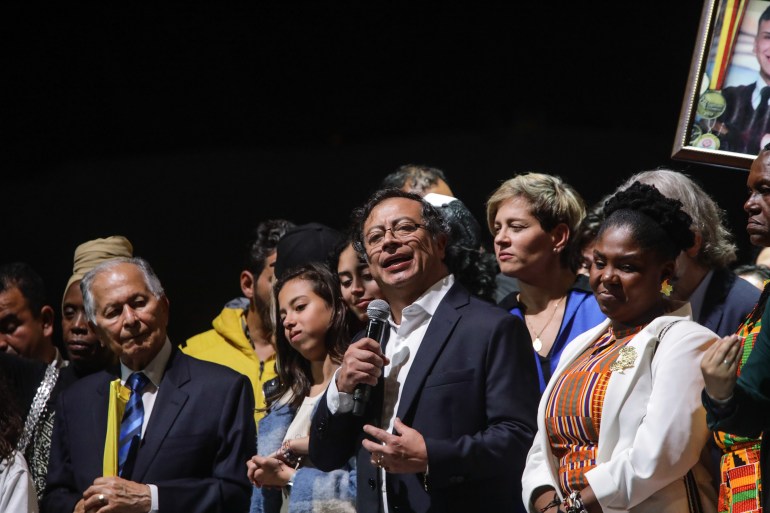Leftist politician and economist, the first leftist president of Colombia; He won the 2022 presidential election by 50.8%, defeating his rival, Rodolphe Hernandez.
Birth and upbringing
Gustavo Petro was born on April 19, 1960, in the province of Cordoba, northern Colombia, and came from a rural family that had to migrate to the capital, Bogota, to escape poverty and violence.
Influenced by Cuban leftist revolutionary leader Fidel Castro, he had a relationship with the late Venezuelan President Hugo Chavez, so his opponents called him "Castrochavista".
Study and training
Educated by monks, Pietro graduated from the University of Colombia Xternado in Bogota, majoring in public administration, environment and population development, a master's degree in economics, and a doctorate in new directions in business administration.
He is a fond of the Colombian writer and novelist, Nobel Prize winner for Literature Gabriel García Márquez, so that he chose for himself during his secret work in the "M-19" organization the name "Aureliano", one of the characters of the novel "One Hundred Years of Solitude" written by Marquez. .
political experience
Since his youth, he has been affiliated with the "M19" organization, one of the armed organizations that participated in the internal armed conflict between 1974 and 1990, the year in which a peace agreement was concluded with the organization.After
the 1990 peace agreement, Petro contributed with others to founding the Democratic Alliance Party, which was established From the M19 movement, he became the second most important political force in the Constituent Assembly (Parliament) in 1991, and Petro was elected a member of it.
He was re-elected to the House of Representatives in 1998, with the support of the "Alternative Path" movement, which he founded with former members of the Democratic Alliance Party.
He was named Congressman of the Year by his colleagues and by the national press for his condemnation of corruption and his debates on matters of political control.
He served as a senator for the republic from 2006 to 2010, at which point he revealed what was said to be a scandal involving senator politicians with armed groups, after which more than 60 were arrested in the council, and Petro was chosen to be the political figure for 2010. He
served as Mayor of Bogota from 2012 to 2015.
Gustavo Petro (centre) held several political and diplomatic positions before entering the presidential elections (Anatolia).
He ran for the presidential elections in 2018 and received the second-highest number of votes, and on June 19, 2022, he defeated his rival, Rodolphe Hernandez, with 50.8% of the votes, and was elected president, promising many reforms.
It is described as one of the generation of leftists who inherited the legacy of the left of the sixties and seventies and formed a bridge towards a new generation of leftists who are more concerned with environmental problems, women's issues, and confronting racial discrimination.
He consistently topped public opinion polls as a result of his pledges to redistribute pensions, his offering to enroll in public universities without fees, and the fight against deep class inequality.
He also promised to implement all the terms of the peace agreement signed in 2016 with the militants of the leftist Revolutionary Armed Forces (FARC), and said that one of its results was that a former rebel like him became president of the country.
Petro says that signs of his political awareness began when he was young when he saw his father crying for the death of the leftist "fighter" Che Guevara, and his first steps were when he joined the leftist movement after the military coup in Chile in 1973, which overthrew the leftist Marxist Salvador Allende.
Since his youth, he belonged to the "M19" movement, but some of his comrades in it say that he was a "weak fighter", and he supported this in his memoirs, saying that he did not aspire to military action, despite his conviction in revolutionary action.
Positions and Responsibilities
He worked as a diplomat in charge of human rights at the Embassy of Colombia in Belgium in 1994, a position he held until 1996.
He served as Mayor of Bogota from 2012 to 2015.
He was elected to the Senate in 1998.
He became the first leftist president in Colombia in 2022.
Awards and publications
He received the Luis Carlos Galán Medal from the Congressional Ethics Committees for fighting corruption.
He won the Ombudsman Award for his work in animal welfare.
Won the global leadership award in the field of climate.
He was awarded the title of Professor Emeritus by the national group "Lanos" for his advocacy of human rights and peace.
In 2014, he was honored as the 6th best mayor in the world.
He wrote a book in which he narrated his memoirs entitled "One Life, Many Lives".

